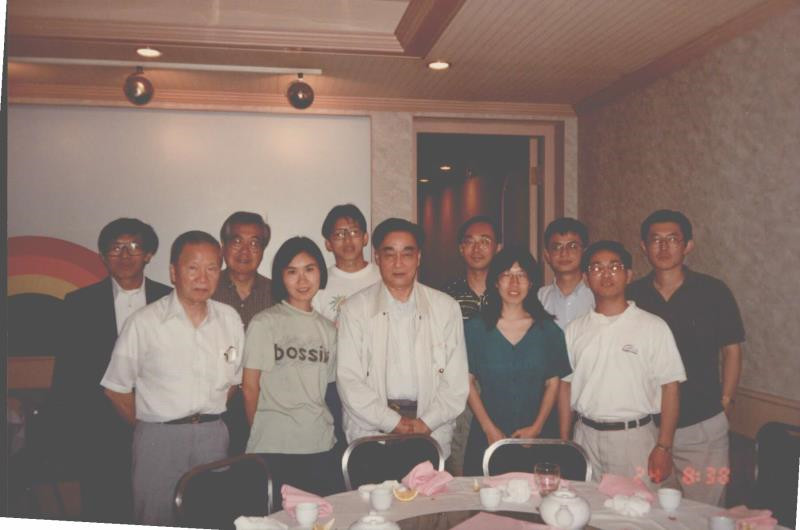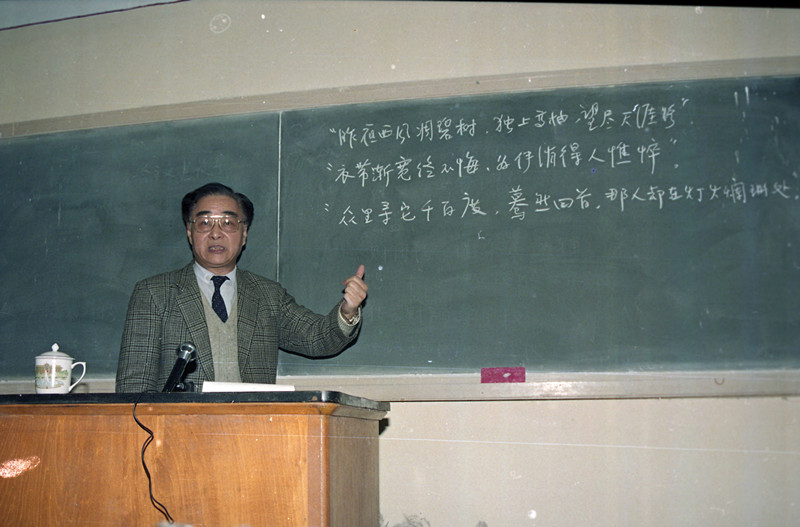On December 9, 2017, the tenth award ceremony of Wu Yongshi Scholarship was held and 6 students were each given 4000 RMB as an encouragement for further study. This scholarship was named after Wu Yongshi, one of TJU’s former presidents and a great educator in modern China.
He is the first person in China to put forward the modern education thought of being comprehensive, open and research based. These three words are taken as the development standard by Chinese higher education institutes, such as Tsinghua University and Tianjin University. The academic policy of “Precise learning, strict teaching and requirements” and reform explorations like “to cultivate talents with sound knowledge foundation and wide knowledge range” are still effective in TJU.
“The proposal of the three words not only needs the intelligence as an educator, but above-average courage and insight.” According to Chang Liaohua, author of the book Brief Biography of Wu Yongshi, during the 1980s and 1990s, China’s higher education was faced with a need to reform. Influenced by the planned economy of the Soviet Union, China’s higher education mode cultivated college students in a “unified purchasing and marketing” way, leading to the shortage of universities’ own characteristics as well as the lack of students’ creativity. With the rapid development of global science and technology, it was extremely urgent to implement China’s reform on the higher education system. “Wu Yongshi has more than once argued that we must break the shackles of our thoughts and change our educational concepts.”

Wu Yongshi( the 3rd person from the left in the first row) met with alumni on a trip to the US in 1996
How to run a university? What’s the future of a university? How to realize the goal that education should be geared to the needs of modernization, of the world and of the future? In December 1986, Wu Yongshi, TJU’s president at that time, firstly proposed “being comprehensive, open and research-based” as universities’ development direction. Furthermore, he wrote an essay after deep consideration to thoroughly discuss his viewpoints like “to build a comprehensive university which focuses on engineering with the integration of science, engineering, liberal arts and management”, “to adhere to reform with an emphasis on improving in order to develop towards a research-based university” and “to keep close contact with the society and the world to build an open-ended education and scientific research center”.
A group of universities, especially key universities of science and engineering including Tsinghua University, were influenced by Wu’s proposition. During the 90th anniversary of THU in 2001, THU set a clear goal to build a world-class, open and comprehensive research university and Wang Dazhong, former president of THU, elaborated and developed the goal. “Being comprehensive, research-based and open” became the benchmark for higher education in China to achieve the world-class level.
Nowadays, when talking about the development of the university, Li Jiajun, former president of TJU, always cites what Wu said in those years like “running a university is creating academic and cultural atmosphere” and “TJU should take the road of comprehensive development”. Last April 21st, Wu Yongshi was hospitalized because of a sudden myocardial infarction. Li Jiajun went to visit him next morning. Although there wasn’t much verbal communication between them, two presidents held hands tightly and at such a time, the faith was inherited.
The inheritance was also embodied in their common pursuit of precise learning and strict teaching.

Wu Yongshi Giving a speech in 1990s
“Listening to professor Wu’s class feels like enjoying a symphony.” Fei Mingqi, the senior engineer at the professor level who is over seventy years old, expressed that when he recollected the course of “Theory of Electromagnetic Fields” given by WuYongshi about 50 years ago, he felt that the scene was still visible before his eyes. “His pursuit of excellence towards teaching was fascinating and admirable.”
The academic policy of “Precise learning, strict teaching and exact requirements” put forward by Wu makes strict and detailed regulations for major teaching processes, such as classes, exams and practice. “Everything he demanded others to do, he would do first and make it himself”. TJU’s professor Dai Jufeng remembered that Wu supervised graduate students personally even when serving as TJU’s president. “In addition to carefully revising students’ academic papers, he also patiently gave specific comments and advice, pointed out the deficiencies or provided reference materials on an attached piece of paper.” Once Dai Jufeng submitted his paper to Wu for approval and revision and received 8 careful comments from him and his caution and conscientiousness moved Dai most.
“President Wu was strict with himself,” said Chen Rongjin, dean of TJU’s Academic Affairs Office. When Wu was the president, he once had the opportunity to publish his academic works with funds provided by the university, but he refused it!
Even after retiring from leadership positions, Wu never stopped thinking about the development of higher education reform.
In 1994, he attended the First Session of the World Conference on Lifelong Learning in Rome. His proposal that “Lifelong Learning---the great development of education facing the 21st century” gained much attention from domestic educational circles. Whether as a member of experts and participating in colleges’ and universities’ undergraduate teaching assessments organized by the Ministry of Education, or being invited to be the first chairman of Expert Committee on Teaching Evaluation of colleges and universities, Wu meticulously contributed to the development of education with high senses of mission and responsibility.
His eldest son said that after retirement, the day that counts most for his father was TJU’s anniversary day. “On the 120th anniversary, he particularly bought a new pair of shoes and a new shirt.” Therefore, on the Outstanding Staff Commending Conference before the 120th anniversary, teachers and students witnessed the senior president neatly dressed in a suit and accepting TJU’s highest honor happily.
By Song Shuang
Editors: Doris Harrington & Yin Wei






